Opinion
MICHAEL IMOUDU INSTITUTE: INSULTING OUR HEROES PAST

By Tunde Olusunle
Saturday June 22, 2024 will mark the 19th anniversary of the departure of Michael Athokhamien Omnibus Imoudu, the legendary, veteran Nigerian labour leader. Born in 1902, *Pa Imoudu* as he is popularly remembered and revered, exceeded the full century mark in age, living up to 102 years. As far back as 1931 when he was just 29, Imoudu got involved in labour union activities as a member of the *Railway Workers Union,* (RWU), at the time. He became President of the union in 1939, and spearheaded the advocacy for higher wages, de-casualisation and improved working conditions. Renowned for his radicalism, Imoudu instigated several confrontations between workers and employers all in the quest for better deals for workers. He became Vice President of the African Civil Servants Technical Workers Union, (ACSTWU) in 1941 and was at the fore of the advocacy for a *Cost of Living Allowance,* (COLA), to mitigate post-World War II inflation.
He was serially queried for denouncing the preferential treatment accorded European officials above African personnel between 1941 and 1943, and summarily dismissed early January 1943. He was thereafter detained for dissent and released in 1945. For the period between 1947 and 1958, Imoudu was a frontliner of various labour unions. He was President of the Trade Union Congress of Nigeria, (TUCN). Conflicts devolving from the teething organisation culminated in his suspension in 1960, upon his return from the Union of Soviet Socialist Republics, (USSR) and China. For his pioneering role in trade unionism in Nigeria, the former National Institute for Labour Studies, (NILS), located in Ilorin, the Kwara State capital, was renamed *Michael Imoudu National Institute for Labour Studies,* (MINILS), in his honour.
The colourful Second Republic Senate leader and legendary politician, Abubakar Olusola Saraki is credited with facilitating the siting of the institution in the Kwara State capital. Former President Usman Shehu Shagari laid its foundation stone in May 1983. MINILS received tremendous support during the governorship regimes of Bukola Saraki, son of the older Saraki, and Abdulfatah Ahmed his successor. Both former Kwara State chief executives, undertook the construction of befitting operational and residential facilities in the institute as part of their corporate social responsibility, (CSR), to a federal establishment headquartered in their “area of responsibility,” (AOR), to adopt a military terminology. If you entered the premises of MINILS those good old days, it breathed life and flaunted environmental aesthetics.
If Pa Imoudu were to pay a visit today, to MINILS for any reason this season of his remembrance, however, he will be grossly appalled and disoriented by the subsisting state of the institute. MINILS by the way, is supposed to be a pioneering establishment in West Africa, dedicated to capacity building for workers, employees and government officials. As you veer off the Ajasse-Ipo to Ilorin road onto the stretch which leads into the institute, your sensibilities are pitilessly assaulted by rot and disorder which stand guard on both sides of that short stretch. Kiosks, stalls, shops, decrepit buildings, rusted roofs, a cacophony of nondescript structures, constitute themselves into a riotous *mammy market,* an expression and concept popularised by our brothers at arms. It refers to those watering holes which spawn and squirm, at the backends of military barracks, which satiate their patrons with liquid and culinary varieties.
The entrance gate is totally uninspiring. It just sits there dumb and disconnected. As you advance into the acreage of the institute, you discover that the tarred driveway very much like the portion you encountered beginning from your detour off the major road, can do with some conscientious resurfacing. The greenery within the premises have not been challenged by the mouths of sharpened cutlasses in a long while, nor the humming, slashing anger of the lawnmower. Paint coatings on the perimeter fence have been peeled off either by reason of substandard work previously done, or the convergence of the rage of the elements. Patches of spyrogyra have contributed to the disfigurement of the hedge in places. A ghostly quiet pervades the air, away from the measured boisterousness of a thriving institute.
There is palpable lack of motivation for the generality of the workers, the pervading air also a disincentive for potential trainees. The collective muteness of the physical structures within the institution echoes and reverberates. The *Ollie Anderson Block* long named after an American benefactor of MINILS is the administrative building. It offers no spark or sparkle like the other structures, all collectively sleeping and slumbering. Power outages are the rule rather than the exception and you wonder why the leadership of the establishment wouldn’t avail its workers and course participants alternative energy sources so they can contribute their bits. The hostels in the institute which are supposed to be sources of internally generated revenue, (IGR), are dirty, decrepit, unkempt, utterly dysfunctional. The beds are broken, the beddings unfit for swine. The last batch of participants on a programme put together by the institute, had to rely on water fetched for them in buckets and heaved to their rooms. Such is the level of rot in today’s MINILS.
Issa Obalowu Aremu, a trade unionist and labour leader himself has been the director-general of the institute for about three years now. He was vice president of the Nigerian Labour Congress, (NLC), when Adams Oshiomhole was president, between 1999 and 2007, which coincided with the years Olusegun Obasanjo was President. Aremu initially attended the Ahmadu Bello University, (ABU), Zaria. Unfortunately, he was expelled from the institution in his final year because of activism. Respected scholars and social scientists, Claude Ake and Ikenna Ezimiro rescued Aremu’s educational trajectory by getting him into the University of Port Harcourt, where he graduated in 1985 with a second class upper degree. He obtained a masters in labour and development from the *Institute of Social Studies,* (ISS) in The Hague and was a labour delegate to the National Conference of 2014. He has also been privileged to attend the elite National Institute for Policy and Strategic Studies, (NIPSS), domiciled in Jos, Plateau State.
Unfortunately, these glossy credentials have not been manifest in Aremu’s administration of MINILS thus far. Aremu, who in years as comrade would rail at the wastefulness of bourgeois leaders, today reportedly drives around in Kwara State with a convoy of three or four cars. Not even the prevailing national economic crunch emblematised among others by spiralling fuel costs has mitigated this penchant for unnecessary exhibitionism. He is said to have a detachment of security details from the Department of State Services, (DSS) and the Nigerian police, escorting him around and about.
On his trips to Kaduna where he has been primarily domiciled for most of his working life, or Abuja, he is received at the airport by two official vehicles complete with armed escorts. They typically depart Ilorin ahead of his flights. The Vice Chancellor of the University of Ilorin in the same city, Wahab Olasupo Egbewole, a professor and Senior Advocate of Nigeria, (SAN), who oversees a student community in excess of 50,000 students moves around innocuously in the same Ilorin. This city by the way is relatively peaceful, posting low crime indicators compared to many others.
If stories and innuendos are to be credited some believability, there is this insinuation that there seem to be no demarcation between the official and the personal in MINILS under Aremu. The institute for instance groans for lack of operational vehicles to run its affairs. Yet some of its healthier motorised assets are said to be in the custody of his family members in various locations across the country. The names of Aremu’s relatives who are non-staffers in MINILS, have been alleged to feature on the list of his delegations on foreign trips, their tickets and estacodes fully paid by the institution. Fiscal frugality is said to be nonexistent in the dictionary of Issa Aremu.
Staff training for job function capacity building, which were usually undergone both externally and internally are reported in the past tense. He was recently pressed by in-house unions to address staffers on issues around capacity training, which he is said to have of completely ignoring in his three years in office. He responded by reluctantly convening a general staff meeting to which, very oddly, he invited the press. He presented an inconclusive compendium containing things he claimed to have achieved in office thus far. He chronicled and appropriated virtually all the legacies of preceding administrations. Aremu listed the *George Meany Computer Centre,* two power generators, and a hostel block, where he set up a non-functional clinic, as his personal achievements. Long-serving civil servants in MINILS, note with deep nostalgia the pluri-dimensional innovations emplaced in the organisation under the watch of former chief executives like Jacob Jeminiwa, John Olanrewaju, Saliu Ishaq Alabi, among achievers.
The institute is also hamstrung in convening tune-up programmes for external participants because of the quantum dilapidation of its facilities and unavailability of funds. This is as Aremu is reported to love the big life. He is said to fancy being adulated as “His Excellency, Comrade Issa Obalowu Aremu, mni, Director-General and Chief Executive of Michael Imoudu National Institute for Labour Studies.” Having contested for the governorship of Kwara State on the platform of Labour Party, (LP), in 2018, he has since coveted and adopted that fanciful referent. He also never fails to remind his audiences in the institute that having been deputy as a unionist to former governor Oshiomhole during his years in labour activism, he also qualifies to be referenced as a quasi-governor! He reportedly never fails to remind his officials how lucky they are to have a man with his accomplishments as helmsman.
The condition of the Michael Imoudu National Institute for Labour Studies, (MINILS) today is a national embarrassment. The institute constitutes colossal disrespect, monumental insult to the name and legacies of Michael Athokhamien Omnibus Imoudu, the iconic Pa Imoudu. Supervising Minister of Labour and Employment, Nkeiruka Onyeagocha needs to take immediate interest in the institute before it is wholly run aground. A physical visit to the institute for on-the-spot assessment will avail her better insights into the prostrate condition of the establishment. This will help in the articulation of a road map for the institute’s comprehensive makeover. Such timely remediation will please the spirits of those who conceived of the institute and that of Pa Imoudu, to no end.
*Tunde Olusunle, PhD, is a Fellow of the Association of Nigerian Authors, (FANA)*
Opinion
5G,IoT and AI to boost global GDP by 2030

By Sonny Aragba-Akpore
With Mobile technologies and services now generating around 5.8% of global Gross Domestic Product (GDP) a contribution that amounts to about $6.5 trillion of economic value, there are strong projections that by 2030, this figure will rise to almost $11 trillion, or 8.4% of GDP.
Global System of Mobile Communications Association (GSMA) says much of this will be driven by countries around the world increasingly benefiting from the improvements in productivity and efficiency brought about by the increased take-up of mobile services and digital technologies, including 5G, Internet of Things (IoT) and Artificial Intelligence (AI).
The GSMA recently introduced the 5G Connectivity Index to provide insights into 5G performance in 39 markets in order to encourage informed decision-making.
In terms of Economic Impact,
the GSMA emphasizes the economic benefits of mobile technologies and services, including 5G, projecting that they will contribute significantly to GDP growth by 2030.
“The GSMA provides specific reports and analyses on 5G in different regions, such as Sub-Saharan Africa, Asia ,Middle East among others highlighting the progress and challenges of 5G deployment in specific areas.”
In Sub Saharan Africa for instance with particular attention on Nigeria,South Africa,Egypt,Kenya and Botswana among others some measure of progress in deployment has been recorded.
The rollout of 5G has brought immense benefits across multiple industry sectors, particularly those involving internet of things (IoT) and artificial intelligence (AI) applications in which the real-time transfer of data is crucial.
More broadly, the adoption of 5G is expected to accompany increased data use across the globe, with forecasts anticipating mobile data traffic of over 300 exabytes per month by 2030, more than twice the volume consumed in 2024 according to Statista.
And with a third of global population expected to be covered by this fifth generation (5G) networks ,a technology that has defined new ways of communication by 2025 ,GSMA
says the technology has surpassed growth projections of all times.
“5G subscriptions increased by 163 million during the third quarter 2024 to total 2.1 billion. 5G subscriptions reached close to 2.3 billion by the end of 2024 accounting for more than 25 percent of all global mobile subscriptions.
“4G subscriptions continue to decline as subscribers migrate to 5G” according to GSMA.
As of the first quarter of 2024, there were nearly two billion 5G connections worldwide, with 185 million new additions. This is expected to grow to 7.7 billion by 2028.”
Statistics show that 5G is the fastest-growing mobile broadband technology, reaching 1.5 billion connections by the end of 2023.
It only took four years to reach this number, compared to 10 years for 3G and more than five years for 4G.
“5G is more than a new generation of technologies; it denotes a new era in which connectivity will become increasingly fluid and flexible.5G Networks will adapt to applications and performance will be tailored precisely to the needs of the user” GSMA submits.
By covering one-third of the world’s population , impact on the mobile industry and its customers will be profound according to GSMA.
To deepen the spread of 5G ,GSMA is working closely with the mobile operators pioneering 5G, “by engaging with governments, vertical industries including automotive, financial services, healthcare providers, transport operators, utilities and other industry sectors to develop business cases for 5G.”
And In order to accelerate the growth and spread, many operators are said to be deploying
AI technology as part of an integral part of telecoms operators’ strategic and operational plans.
“Operators are making important advancements in the deployment of AI technology, which is serving as a transformative force shaping the telecoms industry. By deploying autonomous AI-based systems, operators can enhance operational efficiency, customer satisfaction and security, while also creating new revenue opportunities”.
China, South Korea, the United Kingdom, Germany, and the United States are the leading countries with robust 5G coverage in the world.
Since the first commercial launches of the fifth generation of mobile networks in late 2018, these five countries have emerged as leaders because multiple companies in these countries have deployed networks and are selling compatible devices. Countries including Switzerland and Finland are up and comers in 5G development, though they have limited deployment.
In China there are three Companies leading in deployment.
The world’s largest 5G network was launched by the three largest Chinese network operators Oct 31, 2019, according to the state-run news agency Xinhua. These are China Mobile, China Unicom, and China Telecom which all activated their networks in less than five months after they were issued 5G licenses.
Each of the network operators offered their 5G services at $18 per month in 50 Chinese cities at the beginning of the launch.
GSMA expects 36% of China’s mobile users to be using 5G by 2025. That’s about 600 million subscribers, who would also make up 40% of the entire global 5G market by this year.
This is all despite efforts made by the United States government to hamper the progress of Chinese vendors, though those efforts may affect how Chinese companies may expand into the global market.
In South Korea,SK Telecom and Korea Telecom run as the main competitors for the South Korean 5G market.
SK Telecom acquired spectrum in the 3.5 GHz and 28 GHz frequencies to prepare for deploying 5G.
In April of 2019, the Enterprise claimed to be the first mobile carrier in the world to launch 5G services to work on 5G smartphones. SK Telecom asserted an edge over rival Verizon, as the former launched 5G services available at the same time as Samsung Galaxy S10 5G smartphone launched in South Korea. Verizon launched mobile 5G services in the U.S. before a 5G enabled smartphone was available to U.S. consumers.
SK Telecom also conducted tests with a 5G Standalone (SA) Core (a core not reliant on the 4G network) for their 5G network in cooperation with Samsung Electronics.
The world’s largest 5G network was launched by the three largest Chinese network operators Oct 31, 2019, according to the state-run news agency Xinhua. These are China Mobile, China Unicom, and China Telecom which all activated their networks in less than five months after they were issued 5G licenses. Each of the network operators offered their 5G services at $18 per month in 50 Chinese cities at the beginning of the launch.
“What we are seeing is a concerted effort by the Chinese — the operators, vendors, and government regulators — to deploy 5G as quickly as possible,” Chris Nicoll, principal analyst at ACG Research, pointed this out in a November 1, 2019 SDxCentral article.
With all of these players working together, the three network operators had collectively deployed nearly 86,000 5G base stations peaked over 130,000 by the end of 2019. The latter number breaks down into China Unicom and China telecom, with each planning to install 40,000 base stations, and the market leader China Mobile to install 50,000.This was the projection by 2019 but they have since overshot this by the beginning of 2024.
The International Telecommunication Union (ITU), says 5G coverage reached 40% of the world’s population in 2023 with an uneven coverage and distribution with developed countries having more coverage than low-income countries:
In Europe ,68% of the population is covered and
Americas had 59% of the population covered while
Asia-Pacific has 42% of the population covered as at 2023.
Arab States have 12% of the population covered.
Commonwealth Independent of States (CIS) had 8% of the population covered.
ITU figures show Africa,s coverage rose to 10 % of the population by 2023 .
The ITU also notes that 90% of the world’s population is covered by 4G, but 55% of people without access to 4G live in low-income countries because In low-income countries, 3G is often the only technology available to connect to the Internet.
The ITU develops and adopts international regulations and global standards to enable the harmonization and implementation of broadband mobile networks.
In Africa, around a dozen nations have launched services including Botswana, Kenya, Mauritius, Madagascar, Nigeria, Seychelles, South Africa, Tanzania, Togo, Zimbabwe, and Zambia but Africa is a patchwork of 54 countries.
And penetration is predicted to be slow.
By 2027, Ericsson predicts that 80 percent of phone users in Europe will have 5G service.
At the same time, 5G subscriptions in Africa, home to 1.4 billion people, May stagnate at a little over 10 percent. Why will so few people in Africa get access to 5G services?
China, South Korea, the United Kingdom, Germany, and the United States remain the leading countries with robust 5G coverage in the world.
While many countries are already providing robust services,Africa remains on the outskirts of 5G services.
The countries in Africa that have launched 5G networks, include South Africa with its roll out
In March 2022, when the Independent Communications Authority of South Africa (ICASA) sold spectrum across several bands.
In Nigeria,MTN rolled out commercial 5G services in Lagos in 2022, with other roll out in Abuja, Port Harcourt, Ibadan, Kano, Owerri, and Maiduguri among others.
MTN Congo announced that it was the first country in Central Africa to deploy 5G.
In Botswana Orange deployed 5G technology to provide new services in the Gaborone and Francistown regions.
Other countries in Africa that have launched 5G Fixed Wireless Access (FWA) services include: Angola, Kenya, Zambia, and Zimbabwe.
Analysts say “5G’s potential is growing due to its ability to deliver fiber-like speeds. However, there are still challenges in the region, such as:
Urban areas are reaching their maximum capacity whereas a large portion of the population lives in rural areas.
This explains why 5G adoption in the sub-Saharan region is currently below six percent “
Analysts report that 5G deployment in Africa faces many challenges, including Spectrum assignment,regulatory issues,infrastructure,security,financial resources among others.
“Spectrum is a limited resource that is already in use by other services, such as TV broadcasters and satellite operators. Governments need to open up frequencies and grant 5G licenses at reasonable prices. “
Infrastructure is another major challenge.
“5G networks require a large initial investment, including expensive devices, antennas, and Radio Access Network (RAN) hardware. The infrastructure needs to be fiberized to support 5G services.
Regulatory conditions also serve as challenges to deployment.
For instance “regulatory authorities may not have started the process for licensing and granting frequencies in the right portion “
“Most of the equipment and devices required for 5G deployment need to be imported.”
There are also security challenges that make
5G technology vulnerable to cyber security threats, such as tracking calls and exposing user locations.
Opinion
Right of Reply: THE PUNCH AND BUSYBODY BUSINESS

The recent declaration of a State of Emergency in Rivers State has triggered diverse commentaries from a wide range of Nigerians.
Almost everyone hailed the presidential proclamation because of the visible threat to law and order in the state at the time the action was taken. Of course, there were a few naysayers who read political meanings into an otherwise sincere and prompt intervention.
One such negative interpretation is the position taken by the Editorial Board of The Punch newspaper. In one of its editorials published on the matter, the national daily claimed that the entire crisis was caused by what it described as “the needless meddlesomeness in the governance of the state by its former governor and Tinubu’s Federal Capital Territory Minister, Nyesom Wike….” It is unfortunate that this narrative and others like it have become commonplace in the media space.
How did the Editorial Board of a reputable newspaper arrive at such a conclusion? Their claim that the Sole Administrator, Admiral Ibok Ete Ibas (rtd), has been acting a script purportedly written by the Minister of the Federal Capital Territory, Nyesom Wike, is also faulty and has no iota of truth.
They also faulted the sacking of all political appointees who served in Governor Siminalayi Fubara’s administration, insinuating that their replacements were drawn from Wike’s political camp. Again, nothing can be further from the truth.
Since his appointment as the Sole Administrator of Rivers State, Admiral Ibok Ete Ibas has been running the state with the abundant human resources available in the state and has not imported anybody from outside the state. Did the Editors of The Punch really expect him to run the administration with the politicians loyal to the suspended governor?
Do they not know that the crop of political appointees who served Fubara would have found it difficult to work with the Sole Administrator?
Certainly, they know the truth, but they have chosen to stoke the fire to generate more tensions in Rivers State.
Certain interests might have commissioned this editorial to cast aspersions on the Sole Administrator and raise doubts about his capacity to run the state.
It may also have been the handiwork of Wike’s political detractors, the man whom many politicians love to hate for no other reason than envy and jealousy.
We urge the Punch newspapers to seek a better mode of intervention in the political situation and not dwell on innuendos and unsubstantiated allegations against certain political actors in order to blackmail them.
Dr Ike Odogwu
Opinion
“Chief. Dr. Ekuogbe Akpodiete; A Philanthropist, Lawyer, and Statesman”
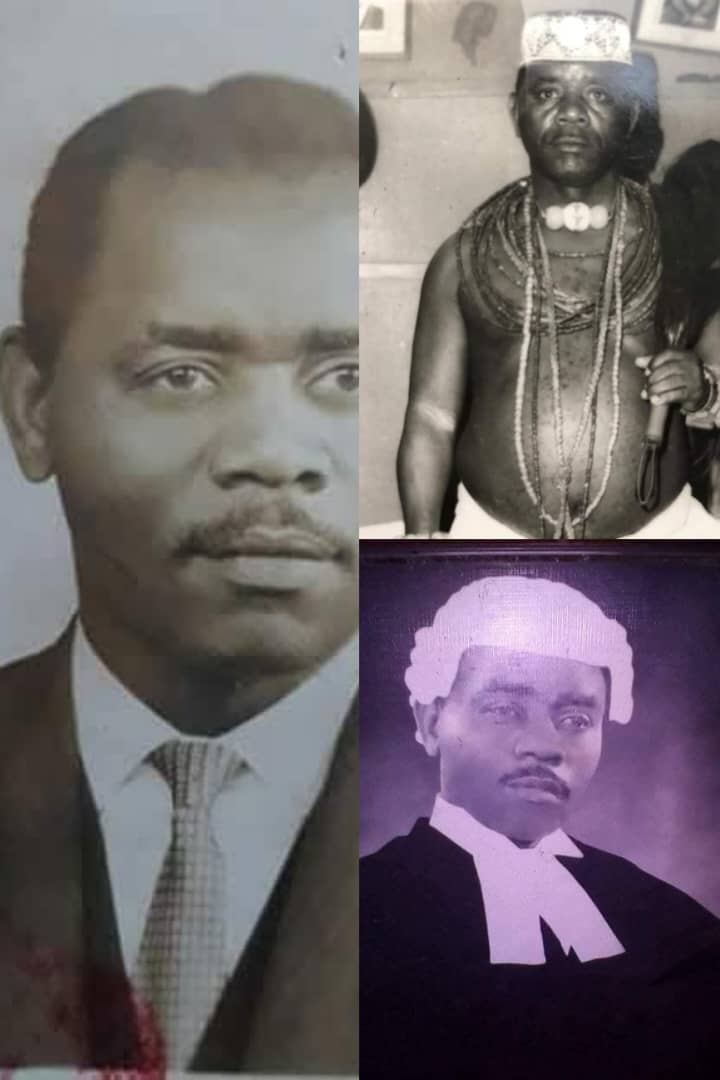
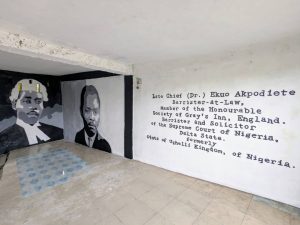
In a life of achievement, Chief Ekuogbe Akpodiete popularly called the Duke by his contemporaries in the UK was an assessment clerk, post office clerk, a court interpreter, an educationist, a business man, a political party chieftain, a Barrister and Solicitor, a Magistrate, the Otota (the Prime Minister) of Ughelli kingdom which is the highest traditional chieftaincy office that underpin the royal office of the Ovie of Ughelli Kingdom.
He was a trail blazer, a strict disciplinarian, a lover of people, and a philantropist. He saw to it that people lived in peace and happiness.
Born on the 4th of April, 1924, to parents cut from an industrious mould, Chief Ekuogbe Rowland Gregory Akpodiete took zealously to education that neither his mother Ughweriaka who was a trader, nor his father Akpodiete who was a farmer had.
He attended the Native Authority Primary School, Ughelli, and Enitona High School, Port Harcourt, for his secondary school education.
He thereafter had a brief teaching career in primary schools in Ofuoma near Ughelli, he worked as a process clerk in the then Sapele Township Department between 1950 and 1953, serving at the same time as an interpreter in the local courts.
He proceeded to the United Kingdom to seek the proverbial Golden Fleece where he worked and paid his way through, studying Law. He was admitted into the Honourable society of Gray’s Inn, England, in 1965, and shortly after, he returned home to Nigeria and attended the Nigerian Law School. He was called to the Nigerian Bar in 1966. He immediately started practice in Lagos. However, his practice in Lagos was regrettably abridged by the Nigerian Civil War, which drove him to his hometown Ughelli in 1967, where he continued to practise among his kith and kin as the first Legal Practitioner.
Chief Ekuogbe Akpodiete established himself in Ughelli. After the civil war, he served in the now defunct Mid-western State Judiciary from 1972 to 1975 as a Magistrate.
He was conferred with the chieftaincy title of Urhukperovie of Ughelli kingdom (the light of the King) by the then reigning Ovie of Ughelli, His Royal Highness Oharisi II of blessed memory in 1977.
In the quest for more knowledge, he went back to England for his Master’s degree in law (LL.M) and later a Ph.D. at the University of Warwick.
He was awarded an honourary doctorate degree (Ph.D) by Tenesse Christian University from the United States of America in 1991.
He became the Otota (the Prime Minister) of Ughelli Kingdom in 1986, an office he occupied until his demise on 9th April 1995.
Chief Ekuogbe Akpodiete was also politically involved. In the heady days of the Awolowo-led Unity Party of Nigeria, he was the party’s legal adviser in Ughelli and was on hand to assist during Chief Obafemi Awolowo’s campaign hosting in Ughelli and its environs.
In view of his love for people and entertainment, he established a popular cinema house, one of the first in Ughelli, known as REGA cinema, coined from his names, alongside an entertainment place called Unutakunu (people talk to people).
Chief Ekuogbe Akpodiete was blessed with wives and many children, grandchildren, and great grand children.
Mr. Olotu Akpodiete, PhD
Executive Director
Olotu & Ekuogbe Rowland Akpodiete foundation
-
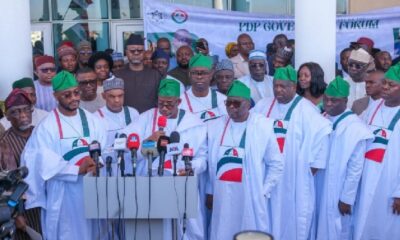
 News21 hours ago
News21 hours agoPDP governors declare support for Tinubu
-

 News24 hours ago
News24 hours agoEx-finance minister rearrested in new fraud probe
-
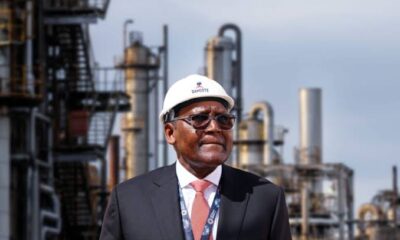
 News21 hours ago
News21 hours agoHope for Nigerians as Dangote refinery slashes petrol price again
-

 News24 hours ago
News24 hours agoFubara: How can I forgive somebody who never requested for it– Wike
-

 News21 hours ago
News21 hours agoRivers Emergency Rule: Abbas inaugurates 21-member panel
-
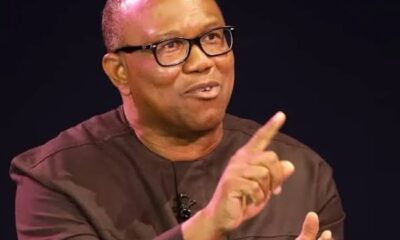
 News23 hours ago
News23 hours agoPeter Obi asks president Tinubu to suspend France trip
-

 News20 hours ago
News20 hours agoN1.3trn CBEX Scam: EFCC caution Nigerians against Ponzi Schemes
-

 News7 hours ago
News7 hours agoFG expresses sympathy for CBEX victims, urges a united effort to combat Ponzi schemes





